68% of marketers believe AI upskilling is essential but fear for customer privacy, not job loss.
With the use of AI continuing to grow and more tools integrating generative and ChatGPT applications, upskilling can help marketing professionals stand out in a competitive and fast-paced industry.
Capterra’s Futureproof Marketing Survey finds that 68% of marketers believe that learning to use AI technology is essential to their career development, despite the sentiment that the hype surrounding AI tools or technology is overblown*. So the question is how can your company use AI to its advantage and what training is necessary to upskill both new and existing employees?
/ Key findings
Marketing managers look for AI skills when hiring but soft skills are most desired: 53% say when considering hiring a new marketing employee or team that they specifically look for AI skills or experience. However, the top competencies they believe are key to success in today’s job marketing are soft skills including 47% adaptability or flexibility (48%), collaboration and teamwork (45%), and leadership (44%).
More AI marketing training and knowledge-sharing is desired by marketers: 41% of marketers indicate they have some basic knowledge of AI but require more training.
Marketers have varied opinions on AI hype, regulation, and personal impact: 56% of marketers are personally skeptical about using AI for marketing while 62% agree that the technology needs government regulation.
Providing training and clear guidelines can help give employees the upper hand: 61% of marketers rate the availability of AI training resources specifically for marketers or advertising professionals at their company as adequate but also say it could be better.
AI technology: More hopes…or fears?
Generative artificial intelligence has opened a new world of possibilities for marketers. In fact, a majority (83%) have already adopted AI marketing tools to perform their day-to-day work tasks and anticipate a range of benefits, particularly when it comes to efficiency and productivity improvements.
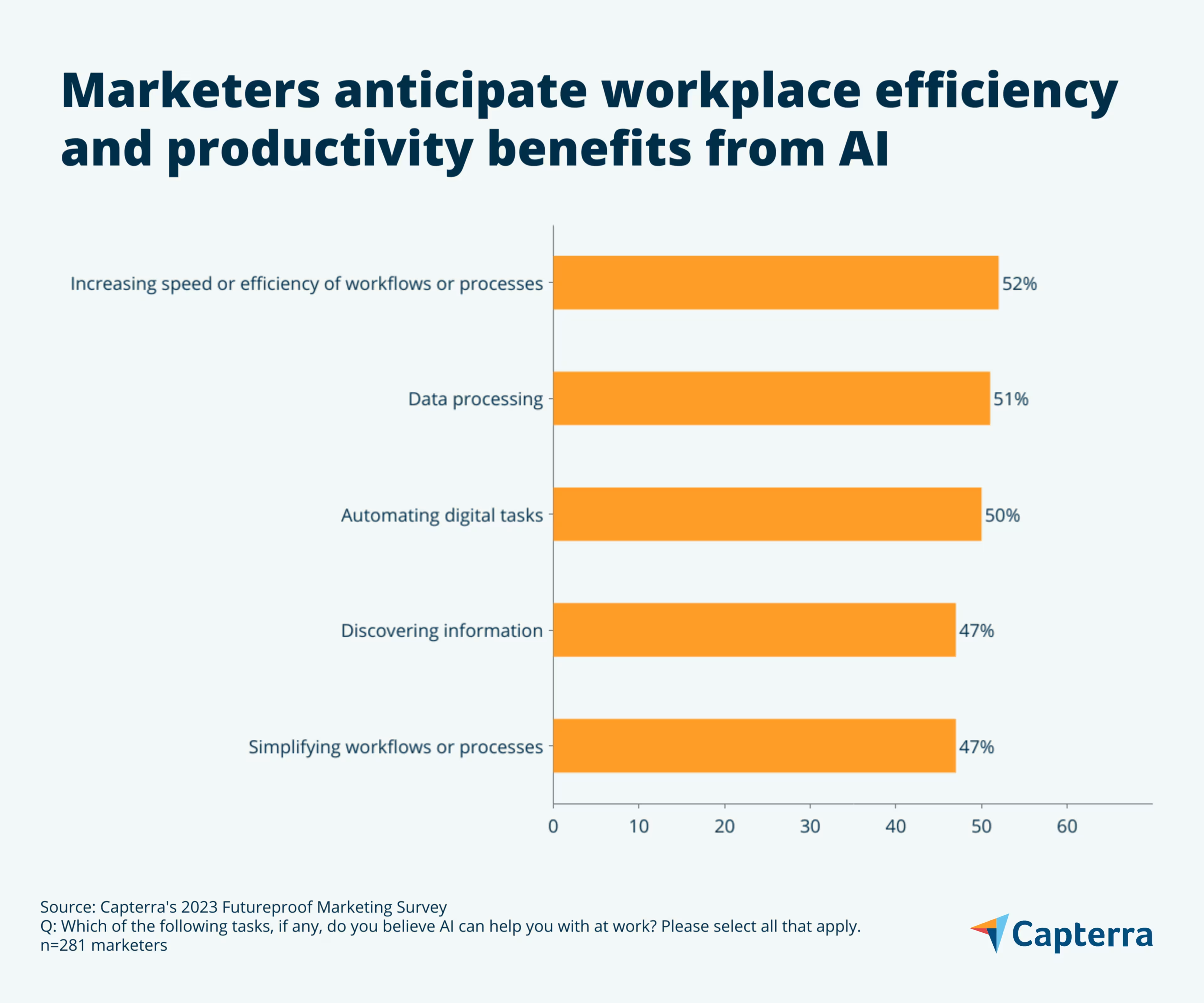
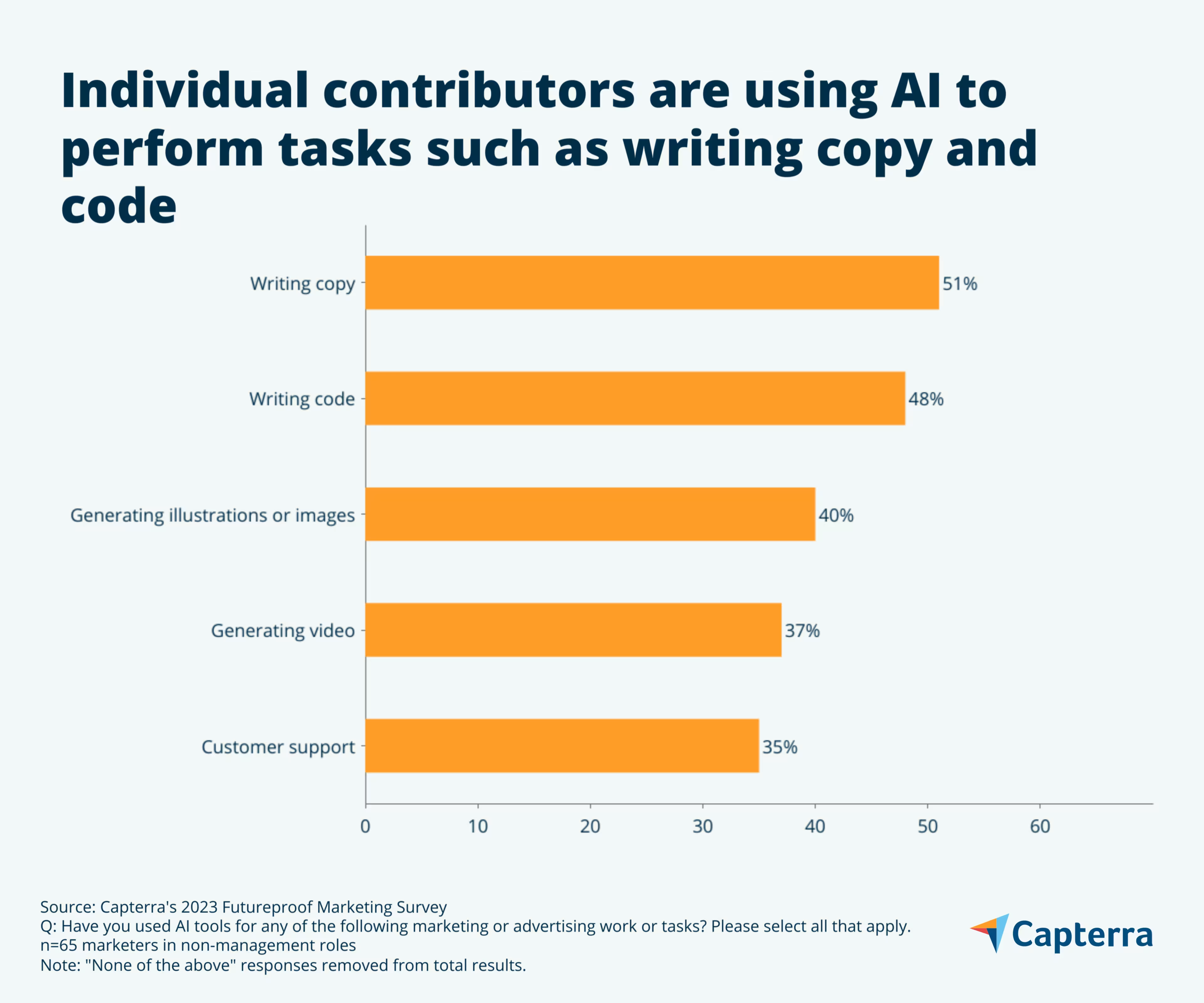
“AI is improving processes, not eliminating people,” says a survey participant. The concern that AI will take away tons of jobs is clearly not felt by the majority of marketing professionals. Our research finds that 48% of surveyed marketers agree that AI will ultimately create more jobs than it will eliminate.
However, there is still much to learn about the technology’s capabilities and how it will directly impact marketing careers through improving or performing common marketing tasks such as data analysis, content writing, or coding.
/ Pro tip
With generative AI technology dominating headlines in the marketing and tech world, it’s easy to mix up what is simply “hype” and what AI realistically can do to replace common business functions.
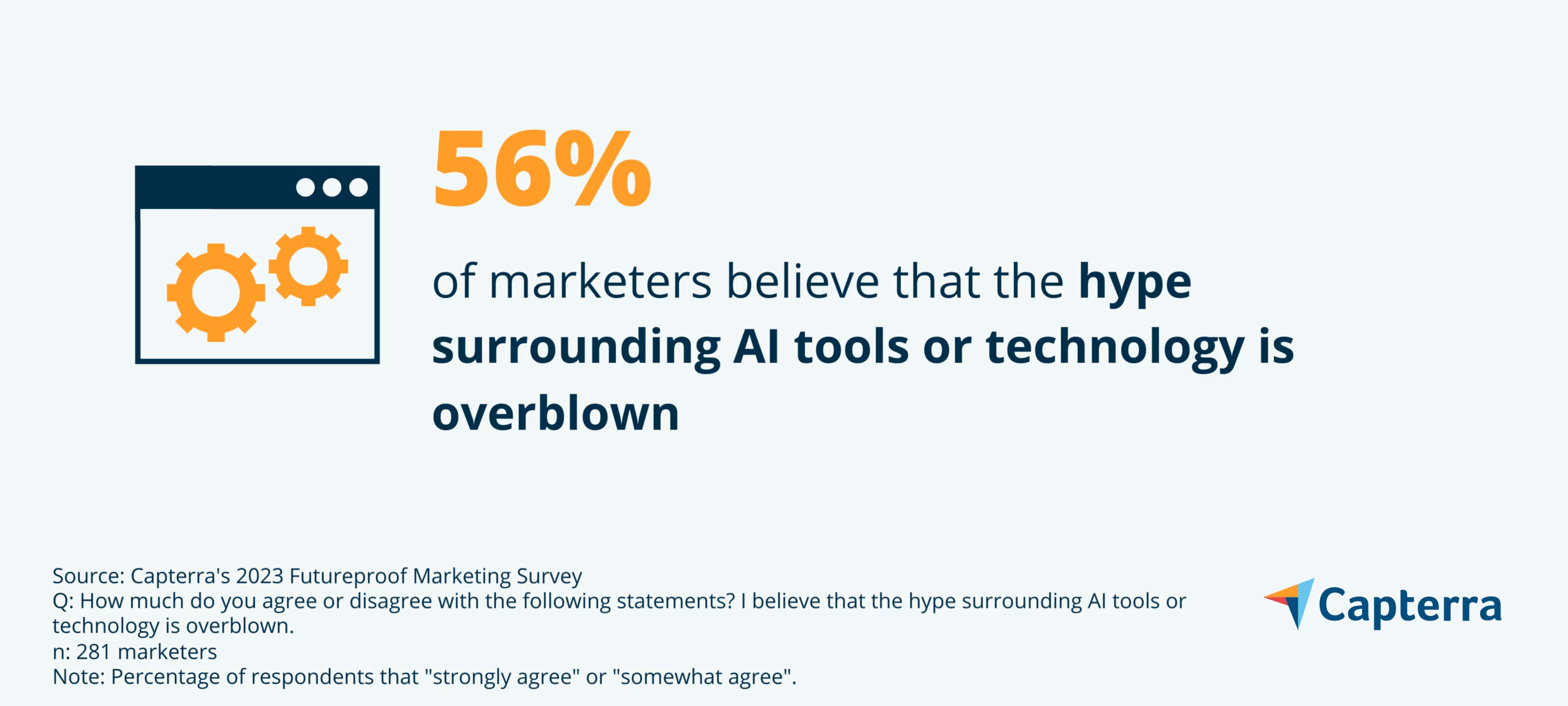
When adopting new AI tools, think about selecting specific tasks and workflows within your company that are in need of streamlining to see how these tools can best help you. However, be cautious when considering AI for a complete replacement of common marketing functions without human oversight and careful vetting.
Hiring managers hone in on AI, but soft skills are just as important
Among hiring marketing managers, directors, or supervisors, 53% say they specifically look for AI skills and experience when considering hiring a new marketing employee or team. However, the top competencies hiring managers believe are key to success in today’s job market are soft skills (e.g., social or interpersonal) over technical skills such as data literacy.
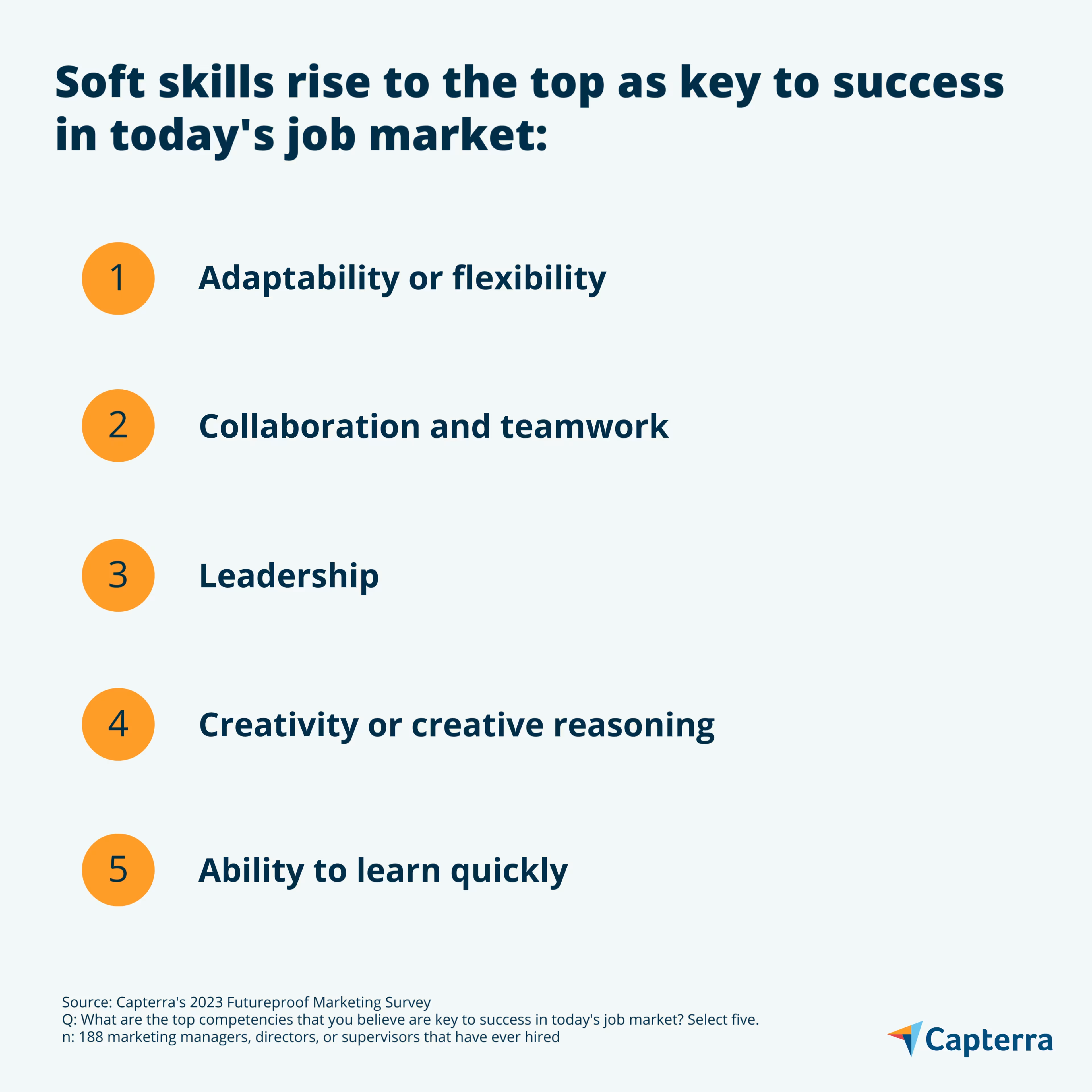
Marketers looking to upskill on using AI tools shouldn’t devalue the power of soft skills that tend to stand the test of time. Soft skills such as flexibility or comfort with ambiguity go hand-in-hand with being able to quickly learn and adapt to new technologies that often require a lot of trial and error.
However, among marketing managers, one-third indicate that technology and software skills are where they perceive the largest gaps within existing skills and the skills needed to meet marketing business goals. AI is a rapidly evolving technology that will require new investments in training and education from employees looking for a competitive edge.
In the future, strong soft skills and AI skills will be crucial to landing any marketing job. A marketing generalist with well rounded soft and technical skills may become the new hero that can understand how the technology fits into solving for a specific business need.
/ Pro tip
Design or invest in training programs that strike a balance between AI technical skills and soft skills development. The combination of human expertise, creativity, and adaptability with AI tools can position marketers for success in the AI-drive landscape.
Training is essential in the rapid change AI era
If you’re not applying AI at work, you may be falling behind, especially when many marketing professionals are already seeking AI-specific training. In fact, 68% of marketers say that learning to use AI technology is essential to their career growth or development.
We found that marketers self-report an intermediate to advanced proficiency level regarding their AI technology skills. Forty-one percent of marketers indicate that their current proficiency level in AI skills falls into the intermediate category — meaning they have some basic knowledge, but require more training.
AI training in data analytics, automation, and writing are especially desired among marketers, likely because these tasks are highly common or repetitive marketing functions or because they are the top tasks that improve the value of marketing.
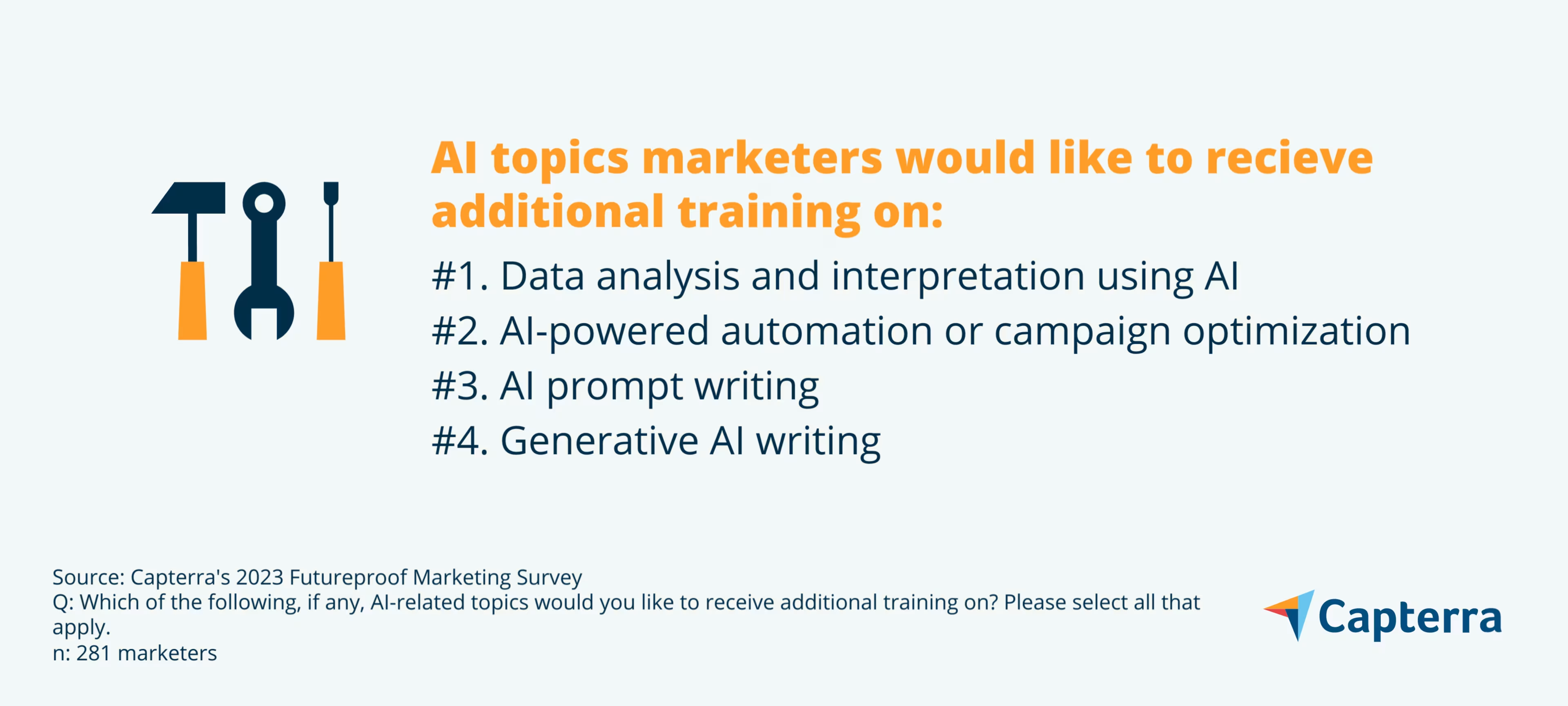
Many organizations are looking to or have already started incorporating AI-specific training. Nearly half (49%) of surveyed marketers say their organization has conducted a formal training related to AI tools or technology usage (including open source, free, or proprietary tools) in the last six months.
But there is still room for improvement when it comes to the access of AI-specific training materials. Sixty-one percent of marketers rate the availability of AI training resources and information specifically for marketers or advertising professionals at their company as adequate but could be better.
A big part of training is correcting any misconceptions surrounding AI or particular open source generative AI tools. An example of that lies within the misconceptions that we tested surveyed marketers on concerning ChatGPT.
Common misconceptions about OpenAI’s ChatGPT among marketers who have used AI tools or ChatGPT:
It’s not possible to prevent your data/conversations from being used to train ChatCPT models. 100% of marketers in our survey thought this was true. Although this might be considered a trick question, ChatGPT now lets you disable your ChatGPT history so your conversations aren’t used to train AI models. However, keep in mind that even with history turned off, conversations are still kept for 30 days for monitoring before they are permanently deleted.
ChatGPT has knowledge of current events. 100% of marketers in our survey thought this was true. In fact, ChatGPT is only trained on data through September 2021, so it has limited knowledge of events that have occurred since then.
ChatGPT can cite its sources. 100% of marketers thought this was true. In fact, models cannot cite their sources as they may be inaccurate or inconsistent.
/ Pro tip
Your business can effectively craft AI-specific training or resources by identifying and prioritizing the most common use cases where AI can add value and drive impactful outcomes to your team’s workflow. As noted in our survey results, this could include tasks such as analysis, automation, or writing. It may be less about the sheer number of tasks AI can absorb and more about determining the ones that are draining the most time and effort, blocking your team’s ability to innovate or strategize.
Marketers torn on regulation
Marketers may continue to grapple with how to harness AI applications given the fast pace of AI adoption, uncertainty regarding regulation, and varied opinions on the technology’s usefulness when it comes to marketing and advertising.
As AI technology continues to advance rapidly, regulatory bodies are working toward developing rules and guidance to keep pace. We’ve seen the E.U. take steps toward passing major laws to regulate AI while the U.S. is expected to follow suit.[1] Nonetheless, AI technology poses challenges such as privacy concerns, data security, algorithmic biases, ethical implications, among other issues.
Our research illustrates a lack of consensus among marketers as to how AI’s regulatory future should unfold with some favoring stronger regulation while others feeling it is unrealistic or too limiting:
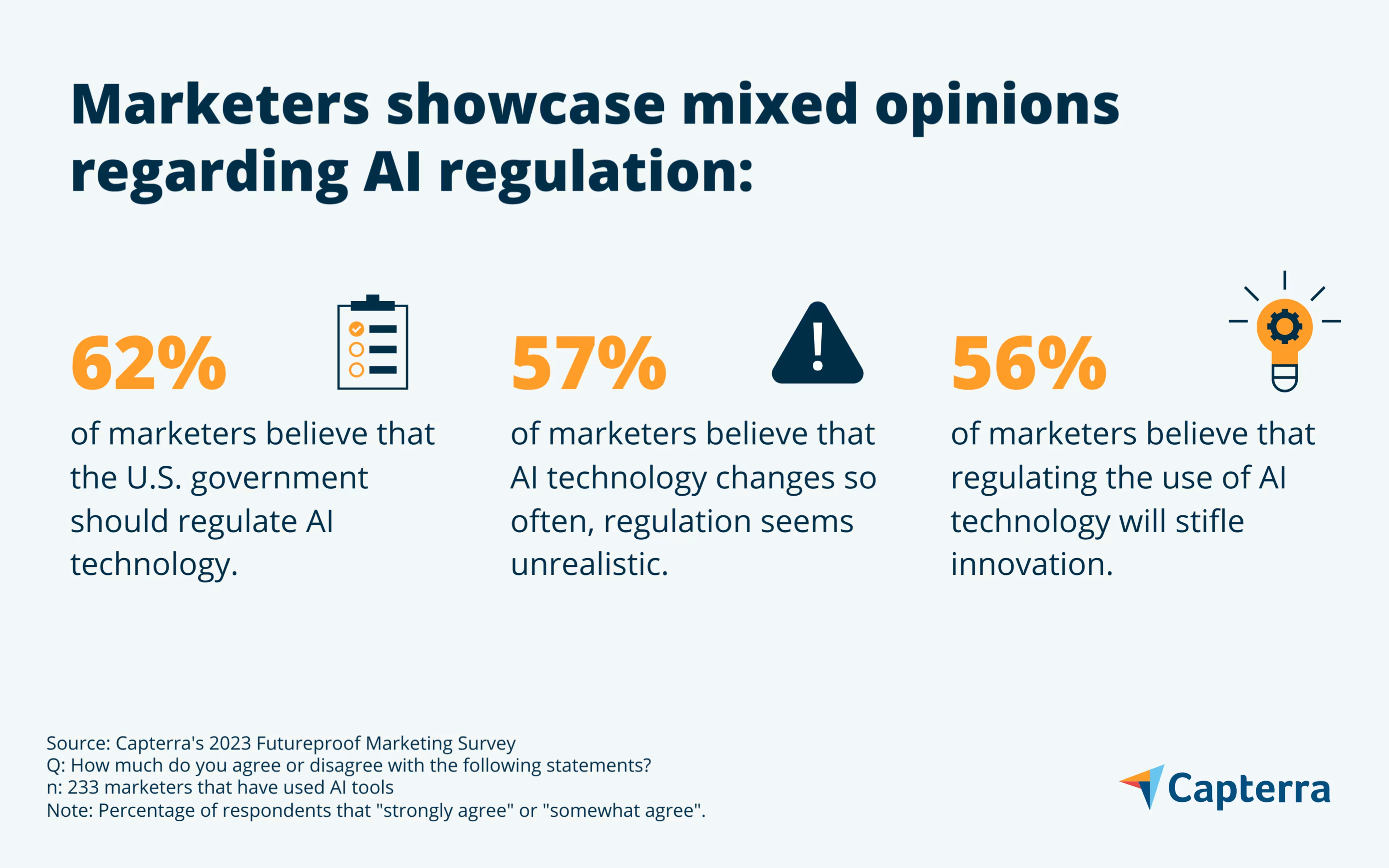
Despite the varied nature of opinions about how regulations will unfold surrounding AI, it is vital that you should focus policies within your company on keeping proprietary information safe and using open source tools responsibly.
Among marketers that have used AI tools for work, 70% say they have used open source tools like OpenAI’s ChatGPT. Among this same group, 55% are concerned about their company’s proprietary company information being compromised by such tools.
Regarding personal stances on AI technology for marketing, more are skeptical (56%) versus optimistic (44%). The top reasons for skepticism are a general preference for human interaction (65%), concerns about protection IP or privacy (46%), and a distrust for the technology’s accuracy (41%).
/ Pro tip
Your company should have a usage policy for open source generative AI tools if it doesn’t already. Some common rules may include instructions such as; don’t input personal identifiable information, sensitive information, company IP, turn off history using external tools, monitor outputs, etc. Employees should treat any information posted as if it were being posted on a public site.
Flexible employees are on the right track
There are a spectrum of opinions among marketing professionals when it comes to using AI technology, future regulation, and how it will ultimately impact the workforce. What is clear is that in the time of rapid AI growth and constant change, soft skills like being adaptive and flexible have never been more important.
While many marketers feel positive about their job security (at least in the short-term), they are future-thinking and desire to learn AI specific skills. That’s why it’s essential to build clear policies around how your company uses AI along with maintaining training for new and existing marketing employees.
Interested in learning about how you can harness AI technology for marketing?
Check out an extensive list of AI Marketing Tools Software on Capterra and be sure to check out other insights on marketing trends:

